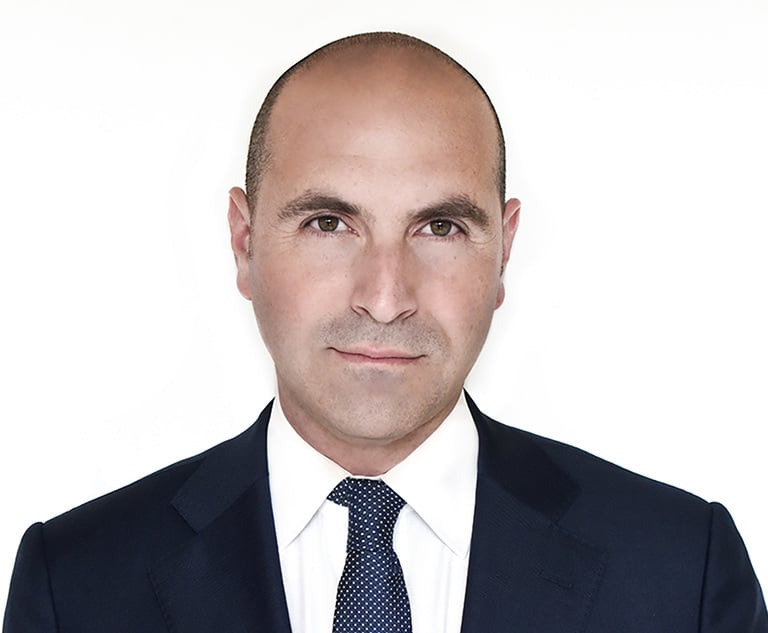 (l-r) Marla Neufeld, Lara Bach, and Amanda “Mandy” Jesteadt. Photos: J. Albert Diaz/ALM
(l-r) Marla Neufeld, Lara Bach, and Amanda “Mandy” Jesteadt. Photos: J. Albert Diaz/ALMLegal Career and Family: Women Work Hard to Find the Right Balance
Every woman deals with family-planning decisions, but many female attorneys who opt for a family have the added bonus of starting when their careers…
April 09, 2019 at 09:36 AM
6 minute read
Every woman deals with family-planning decisions, but many female attorneys who opt for a family have the added bonus of starting when their careers are taking off and their fertility is declining.
Women under pressure to produce billable hours are researching law firm insurance and leave policies and benefits affecting pregnancy, childbirth and child-rearing.
And how to have a baby can be an issue unto itself. Elective embryo and egg freezing, surrogate births, and egg and sperm donations are options that come into play when fertility issues arise or it's just not the right time.
Greenspoon Marder partner Marla Neufeld is a top practitioner in the field. She founded the law firm's assisted reproductive technology practice and is the mother of twins born to a surrogate.
“It's a big decision and commitment to do both, you know, have a career and have a family. I'm a mother, and I'm a practicing attorney. I've been practicing for 10 years, and it's always challenging,” she said.
Reproductive issues for professional women are “definitely becoming more and more a thing of our time,” Neufeld said. Advances in medical technology and expansion of employment benefits offer “a very liberating option” that wasn't available 20 years ago, she said. “It's wonderful. It just allows an element of freedom.”
She's been through infertility treatments and knows, for example, the success rate for pregnancy after embryo freezing is higher than egg freezing. She said the cost of egg retrieval can run $15,000 per cycle, and doctors often recommend two cycles.
Lara Bach is a senior associate in Weil, Gotshal & Manges' complex commercial litigation practice in Miami. She gets questions as president of the Miami-Dade chapter of the Florida Association for Women Lawyers and as a mother of 3- and 5-year-old children. She knows a handful of women who have frozen their eggs.
“I think what factored into the decision mostly is they were progressing in age and knew that it wasn't the right time to have a baby at the moment,” but they still wanted that option, Bach said. “They didn't want to forgo the opportunity even though it wasn't right for them at the time.”
Neufeld has represented attorneys pursuing surrogacy and gets a lot of legal questions about reproduction options from lawyers and other career women.
Women who opt for embryo or egg freezing often have decided they want to have kids but haven't found a partner yet or face intensive medical treatment that could endanger their changes of motherhood.
The what-ifs of parenthood can come up as early as law school. Some women opt to have children early, not others.
While in school, “I was looking at the policies of firms and what they would do” to allow her to advance in the legal profession, said Amanda Romfh Jesteadt, who started at Carlton Fields as a summer associate in 2008. Her children are 4 and 6.
Jesteadt and Bach praise their firms for family-friendly policies.
As a commercial litigation associate, Jesteadt works an alternative schedule with a 75 percent workload and stays a partner track. She takes advantage of work-from-home and other remote work options.
“It's critical for my particular brand of work-life balance,” Jesteadt said. She considers Carlton “a leader in developing policies in women developing their careers.”
The firm offers 16 weeks of paid parental leave, and firm spokeswoman Kate Barth said an associate used the full allotment as a new dad because his dentist-wife couldn't close her practice.
On another subject dear to new mothers, FAWL's lactation room task force has helped chapters create 25 courthouse nursing rooms in Florida. Jesteadt's chapter opened its latest at the South County Courthouse in Delray Beach.
“It's a daily struggle for all working mom-lawyers to balance everything, and I think everyone has their own brand of difficulties, whether it's reliable child care, whether they have the accommodations they need for breast feeding,” she said.
Even with helpful employment policies, Bach said she had to be forceful in her own right.
“I'm lucky that I've set up a system — and I encourage everyone to do this — set up boundaries,” Bach said. “If you don't set those boundaries early, it's very hard to adjust them.”
She heads home for family dinners, and ”everybody knows that I'm back online at 10 p.m.,” she said. “I frequently work until midnight or later on an alternative schedule that works for me.”
Weil policies have been a great help for Bach: up to 20 weeks of paid parental leave, the firm pays to ship breast milk when nursing mothers are out of town, on-demand life coaching and the Bright Horizons program provides a free certified caregiver for family emergencies when a child is sick or a regular caregiver is out.
“They're trying to do as much as they can to make it easy for you to work and parent,” she said. “They are making it easier for me to traverse the everyday burdens that every parent faces while also practicing law.”
Bach still sees room for improvement at law firms.
“What firms need to be doing is look at their books and make sure they have paid parental leave,” she said. “No matter how small the firm is, we should be leaders in that and not lag behind.”
FAWL members raise issues with her against the backdrop of studies showing retention issues for women, especially minority women, in Big Law.
“They want to be able to talk about it more publicly, and ultimately they want their firm to support them so they can do both — be a lawyer and have a family. They're not mutually exclusive.”
On the practical side, Jesteadt developed a personal quirk that has become something of a family joke.
“This was when my kids were babies, but the habit remains. I don't change into my final work outfit until I'm ready to go out the door,” she said, recalling instances of last-minute spit-ups and sticky fingers. “Everybody will be 100% ready to go, and I'm still in my pajamas.”
Read more:
This content has been archived. It is available through our partners, LexisNexis® and Bloomberg Law.
To view this content, please continue to their sites.
Not a Lexis Subscriber?
Subscribe Now
Not a Bloomberg Law Subscriber?
Subscribe Now
NOT FOR REPRINT
© 2024 ALM Global, LLC, All Rights Reserved. Request academic re-use from www.copyright.com. All other uses, submit a request to [email protected]. For more information visit Asset & Logo Licensing.
You Might Like
View All
‘What’s Up With Morgan & Morgan?’ Law, Advertising and a Calculated Rise
10 minute read
Growing Referral Network, Alternative Fees Have This Ex-Big Law’s Atty’s Bankruptcy Practice Soaring
5 minute read

Trending Stories
- 1Read the Document: 'Google Must Divest Chrome', DOJ Says, Proposing Remedies in Search Monopoly Case
- 2Voir Dire Voyeur: I Find Out What Kind of Juror I’d Be
- 3When It Comes to Local Law 97 Compliance, You’ve Gotta Have (Good) Faith
- 4Legal Speak at General Counsel Conference East 2024: Virginia Griffith, Director of Business Development at OutsideGC
- 5Legal Speak at General Counsel Conference East 2024: Bill Tanenbaum, Partner & Chair, AI & Data Law Practice Group at Moses Singer
Who Got The Work
Michael G. Bongiorno, Andrew Scott Dulberg and Elizabeth E. Driscoll from Wilmer Cutler Pickering Hale and Dorr have stepped in to represent Symbotic Inc., an A.I.-enabled technology platform that focuses on increasing supply chain efficiency, and other defendants in a pending shareholder derivative lawsuit. The case, filed Oct. 2 in Massachusetts District Court by the Brown Law Firm on behalf of Stephen Austen, accuses certain officers and directors of misleading investors in regard to Symbotic's potential for margin growth by failing to disclose that the company was not equipped to timely deploy its systems or manage expenses through project delays. The case, assigned to U.S. District Judge Nathaniel M. Gorton, is 1:24-cv-12522, Austen v. Cohen et al.
Who Got The Work
Edmund Polubinski and Marie Killmond of Davis Polk & Wardwell have entered appearances for data platform software development company MongoDB and other defendants in a pending shareholder derivative lawsuit. The action, filed Oct. 7 in New York Southern District Court by the Brown Law Firm, accuses the company's directors and/or officers of falsely expressing confidence in the company’s restructuring of its sales incentive plan and downplaying the severity of decreases in its upfront commitments. The case is 1:24-cv-07594, Roy v. Ittycheria et al.
Who Got The Work
Amy O. Bruchs and Kurt F. Ellison of Michael Best & Friedrich have entered appearances for Epic Systems Corp. in a pending employment discrimination lawsuit. The suit was filed Sept. 7 in Wisconsin Western District Court by Levine Eisberner LLC and Siri & Glimstad on behalf of a project manager who claims that he was wrongfully terminated after applying for a religious exemption to the defendant's COVID-19 vaccine mandate. The case, assigned to U.S. Magistrate Judge Anita Marie Boor, is 3:24-cv-00630, Secker, Nathan v. Epic Systems Corporation.
Who Got The Work
David X. Sullivan, Thomas J. Finn and Gregory A. Hall from McCarter & English have entered appearances for Sunrun Installation Services in a pending civil rights lawsuit. The complaint was filed Sept. 4 in Connecticut District Court by attorney Robert M. Berke on behalf of former employee George Edward Steins, who was arrested and charged with employing an unregistered home improvement salesperson. The complaint alleges that had Sunrun informed the Connecticut Department of Consumer Protection that the plaintiff's employment had ended in 2017 and that he no longer held Sunrun's home improvement contractor license, he would not have been hit with charges, which were dismissed in May 2024. The case, assigned to U.S. District Judge Jeffrey A. Meyer, is 3:24-cv-01423, Steins v. Sunrun, Inc. et al.
Who Got The Work
Greenberg Traurig shareholder Joshua L. Raskin has entered an appearance for boohoo.com UK Ltd. in a pending patent infringement lawsuit. The suit, filed Sept. 3 in Texas Eastern District Court by Rozier Hardt McDonough on behalf of Alto Dynamics, asserts five patents related to an online shopping platform. The case, assigned to U.S. District Judge Rodney Gilstrap, is 2:24-cv-00719, Alto Dynamics, LLC v. boohoo.com UK Limited.
Featured Firms
Law Offices of Gary Martin Hays & Associates, P.C.
(470) 294-1674
Law Offices of Mark E. Salomone
(857) 444-6468
Smith & Hassler
(713) 739-1250






